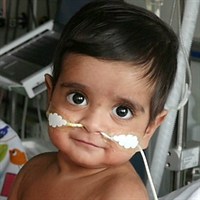Nutrition for babies born with CHD
Babies born with a heart problem can often be referred to the dietitian because they are finding it difficult to gain weight either before or after their heart surgery.
You may find that your baby becomes tired, breathless and a little bit "sweaty" when they are drinking milk from the breast or bottle. All this hard work makes them use up calories; as a result they find weight gain difficult.
The dietitians at Royal Brompton Hospital will help you monitor your baby’s weight and, if there are any concerns regarding weight gain, they can give advice on how to manage this problem.
High-energy milks 
It is quite common for your dietitian to recommend either fortifying (adding to) your breast milk or giving a high-calorie infant formula when there are concerns regarding weight gain. These have been available for a long time and are well tolerated.
Currently in children under one year of age the following milks are available: Infatrini(Nutricia) and Similac High Energy (Abbott Laboratories) are both high-energy formulas and they contain 100 calories and 2.6g of protein per 100mls. They are ready made and available on prescription from the GP. A standard formula contains approximately 70 calories and 1.5g of protein per 100mls so changing the formula is often a quick and easy way to give your baby more calories and protein.
The high-energy milk can be added to baby rice, cereals, home cooked foods, jars and powdered baby foods and is a useful way of adding extra calories.
All babies are different, but once your baby is gaining weight you may be advised to use normal formula again. The most important thing is that you maintain good contact with your dietitian.
Nasogastric tube feeding

If your baby continues to have difficulty with gaining weight and finishing their bottle or breast feed - especially before they have had their surgery - then they might need a nasogastric tube. This is a little tube that passes down into the stomach and it helps reduce all the hard work of feeding and makes sure they get all the milk they need.
Lots of parents become very anxious and upset at the thought of a nasogastric tube. The tube doesn’t hurt the baby and is a wonderful way to help your baby get the nutrition he/she needs and also to get ready for their surgery. Babies can continue to breast feed or drink from the bottle while they have the tube in place, but what we sometimes do is give a little extra down the tube to make sure they get all the milk and calories that they need.
When your baby no longer needs the nasogastric tube, they will go back to feeding from the breast or bottle again. There are lots of different professionals who will help you through this.
What about weaning?
Your baby can be weaned following normal guidelines. Your dietitian or health visitor will be able to provide you with all the information you need. More information about when and how to wean.
Tips for surgery
- It can be a very stressful time for you and your family when your baby comes to hospital for their surgery. If you are breastfeeding, it is really important that you eat and drink regularly so that your milk production is not affected. There are lots of people available to help you during this time and Royal Brompton Hospital provides all breastfeeding mothers with free food vouchers during their baby’s stay.
- Breast milk is good for so many things, but it is particularly good for helping protect your baby’s tummy after surgery so every drop is every precious and nothing is wasted. We support mums as much as possible to keep expressing while their baby is in hospital. There are rooms and equipment available to help you do this.
- Once your baby has had their surgery, they will come back to the paediatric intensive care unit and have a machine to help them breathe. During this time it is a good idea to offer your baby a dummy. Some people dislike dummies and wouldn’t want their baby to have one, but there is good evidence to show that they can help bring comfort and pleasure, and stop the mouth from becoming too sensitive.
Chylothorax
Sometimes after paediatric heart surgery children can develop something called a chylothorax. This is when some fluid called "chyle" has collected around the lungs. One of the ways that we help the children to get better is by putting them on a special diet that reduces the amount of a certain type of fat we all eat called "long chain triglyceride" (LCT). When we take the LCT out of the diet it helps the fluid go away.
Your dietitian will organise the diet, giving you recipes and tips about which foods to eat or avoid while your child is on the diet. It won’t last forever and is usually only for four to six weeks. If your child needs an LCT diet and is still drinking formula, we change it to a special formula called Monogen. We get this for you on prescription from your GP.
If your child is over one year of age, we arrange a prescription for a special fat free formula called Paediasure Juice, or they can have a certain amount of skimmed milk in combination with their special diet.
